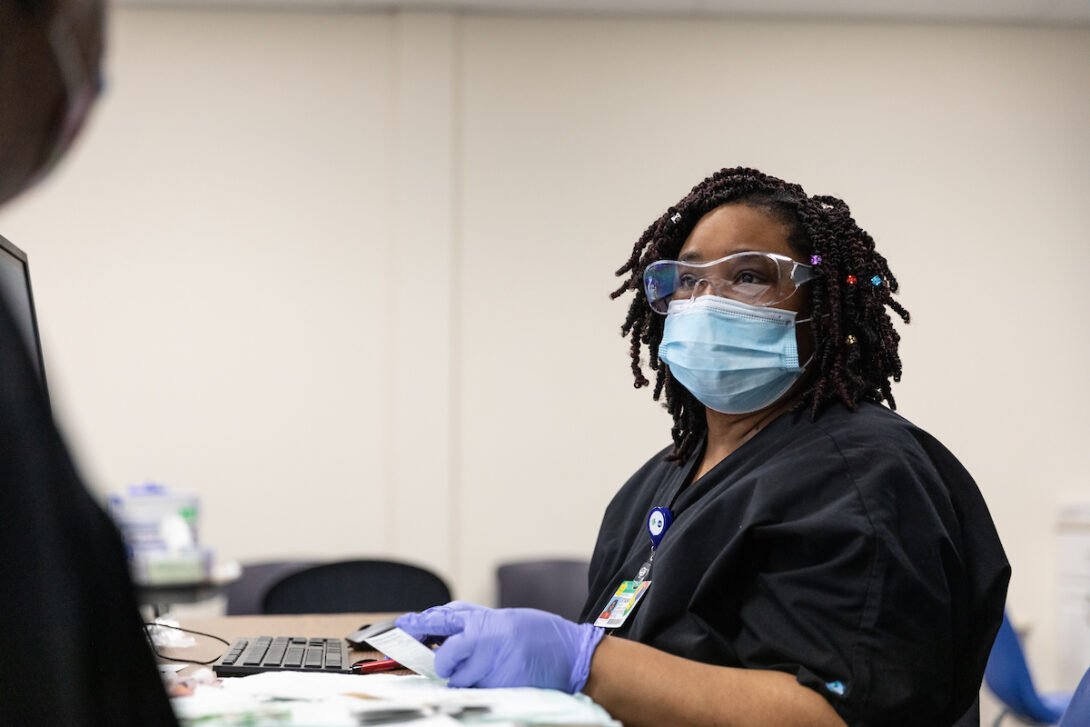Mile Square–Humboldt Park patients can access health care, legal help
x

Patients of the UIC College of Nursing-run clinic, Mile Square Health Center-Humboldt Park, can access legal help along with health care thanks to a partnership between UIC Law and Nursing.
The medical-legal partnership, called LEAF-HE (Legal Advocacy for Health Equity), started in March 2022 and allows all patients of the clinic to be screened for health-harming legal needs. The patients are then referred to UIC Law’s Pro Bono Litigation Clinic, overseen by staff attorney Sarah Sallen, if the needs fall within the scope of the clinic’s legal practice.
“There are so many factors that impact our patients’ overall health,” said Carolyn Dickens, who has been a nurse practitioner at UI Health for 23 years and is also now interim associate dean for faculty practice and community partnerships at UIC Nursing. “Some of these social determinants of health can have legal remedies, but as medical professionals, those are beyond our scope of practice. Now this unique partnership gives us an opportunity to help our patients with a directness and immediacy that is truly progressive.”
The UIC pro bono law clinic can address such legal issues as criminal record expungement, divorce, eviction, employment and custody issues.
Virginia Reising, who helped develop the program when she was a clinical assistant professor at UIC Nursing, said there is a strong connection between legal concerns and mental and physical health outcomes.
“If someone is worried about being evicted, their burden of health care needs increases,” she said. “If someone is worried about being discriminated at work, that worry can translate into depression, anxiety or hypertension — concerns that we, at our health center, are trying to work on improving in our community.”
The partnership is funded by the UIC College of Nursing Dean’s Innovation Fund, a discretionary philanthropic fund, led by donors Judith Hicks, MS ‘75, and Frank Naeymi-Rad.
The program became possible when UIC Law, the city of Chicago’s first public law school, became UIC’s 16th college in 2019. This paved the way for a truly interdisciplinary collaboration — bringing legal and medical expertise together for patients in a way that could not have occurred before, Dickens said.
“We like to look at the attorneys as part of the health care team,” Sallen said. “We’re trying to be more proactive on both the health and legal teams. We often don’t get calls on the legal side until something is much more dire, and the health team isn’t equipped to answer questions about legal issues.”
Under the new program, every patient who enters the clinic fills out a questionnaire, circling whether they have a legal need and would like to be contacted. Next, the clinic’s community affairs specialist, Efren Alonso, follows up with the patients to conduct an initial assessment and intake.
Sallen’s team, which includes two law students, meets with the health care team to discuss the cases and make a plan for follow-up. Two Doctor of Nursing Practice students also have been involved in the project, documenting workflow, making quality improvements and assessing the process for patients.
“We’re constantly educating each other,” Sallen said.
Alonso, who is fluent in both English and Spanish, said one of the most common legal questions relates to criminal record relief, since the Mile Square-Humboldt Park clinic sees patients from the Illinois Department of Corrections who live at two community correctional centers.
Part of his role is to confirm that they have a legal need before referring them to the legal clinic.
This process has resulted in the clinic being better able to address social determinants of health, or the conditions in people’s environments that affect health outcomes, Dickens said. During the process, Alonso has been able to identify social service needs that don’t lend themselves to legal remedies and then connect those patients with resources. For instance, a patient who needs better housing doesn’t have a legal need, but Alonso may be able to help them find housing resources.
Dickens will share a presentation on the program at the January Meeting at the American Association of Colleges of Nursing. Sallen will also share a presentation at the American Association of American Law Schools Annual Conference on Clinical Legal Education in April in California.